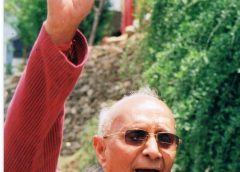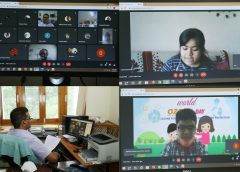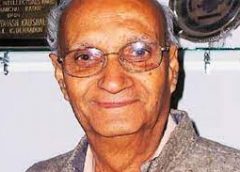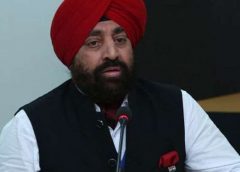Dehradun: 28 September 2021: Law and Science & Technology are his weapons in his feisty crusade for empowerment. Avdhash Kaushal is doing work of a very high standard in India and has been instrumental in organizing and empowering the long neglected hill communities of Uttaranchal and the forest dwelling pastoral nomadic tribe of Van Gujjar.
He took science and technology to Van Gujjars amongst minority (Muslim- Nomads) and trained them to use100 battery–operated wireless handsets that operate two wireless frequencies, 167.25 MHz and 167.725 MHz, through three base camps and one central station covering their entire habitation allocated by the Ministry Of Telecommunication. This is the first time that such communication technology was provided to Van Gujjars in the country. This quick mode of communication had been useful in tracking poachers, illegal wood contractors/forest mafia, controlling forest fires and other natural calamities besides helping the nomads in medical emergencies.
Recognizing Kaushal’s contribution towards the upliftment and empowerment of minority Van Gujjar, Kaushal was invited to address the World Summit organized by United Nations on Information and Technology in Geneva, a group of Van Gujjar also accompanied Kaushal to Geneva.
Because Van Gujjars were not willing to come out of the forests for the literacy drive being launched, he took literacy directly into the forest dwellings of the community and also to continue the tempo of literacy drive during the annual migration of the community with the volunteer teachers accompanying the community. It is for the first time in the world that a forest academy of this type was set up and barefoot teachers accompanied the community on the move. 21000 adult van gujjars made literate, adult education created the demand for childrens education, voting rights, right against illegal eviction from the forest.
A number of Van Gujjar men and women, especially those who proved good at education, were trained as Para Vets and Para Medics equipped to deliver primary health care services to the community, which extended to their animals even during their annual migration of the community to the upper reaches of the Himalayas to treat minor ailments like fever and dysentery. This programme created greater health awareness in the community about immunization and birth control. They have also been linked to government healthcare services. Now they are no longer apprehensive about availing medical facilities from Public Health Centers (PHCs). Traditional use of medicinal plants and herbs is encouraged.
Large number of innovative primary schools in the remote areas of Garhwal region were started. Here children are not only learning computers and videography but also are taught English by volunteer teachers from England and Ireland.
Literacy Programme among Van Gujjars has made the tribals conscious of their rights. Their horizons have expanded with some of them ateending seminars in Brazil, Sweden and Denmark. Because of his ceaseless endeavours, Van Gujjars nomads were included in the electoral rolls. He has also been instrumental in upholding the rights of Van Gujjars to stay in the forest through appeals to the National Human Rights Commission (NHRC).
Intense lobbying and advocacy resulted in the enactment of the Scheduled Tribes and Other Traditional Forest Dwellers (Recognition of Forest Rights) Act, 2006.
21,000 Gujjars can read and write, add and subtract and know how much money they have to get from a trader who buys their milk.
He is a tough fighter who believes in the dictum: “a quitter never wins and a winner never quits”.
He has made his mark as an institutional builder and a man of the masses. In the JaunsarBawar tribal belt he came across the gruesome problem of bonded labourers in Tehri and Uttarkashi. The schedule caste communities in Jaunsar area were bonded labours of the upper caste landlords, He did intense lobbying and advocacy that led to the 1976 Bonded Labor Abolition Act.
Though the Government of India passed this Act in 1976 after strenuous lobbying by Kaushal, many were still deprived of freedom because of lack of awareness and inaccessibility. So, he with his team led an initiative to help free large groups of such slaves by sensitizing youth of that region. The grapevine carried the memorandum of freedom, to the furthest corners.
Law is his weapon in his feisty crusade for empowerment.
His determined drive against the social evil was highlighted by his campaign to end the bonded labour system that was rampant and widespread even until the early seventies. Working against heavy odds, he successfully organized them and helped them in obtaining their possessions back. Taking up this matter at the social as well as the judicial level he brought an end to this highly exploitative social system.
To quote from Mr. Justice P.N Bhagwati recently published book “My Tryst with Justice”,“RLEK therefore, embarked upon a campaign for the benefit of these communities which had, for centuries been neglected and forgotten. It also espoused the causes of these neglected sections of the community in courts of law for asserting and establishing their rights and entitlements and fought these cases for their benefit. He paved the way for the enactment of the Bonded Labour Abolition Act. This was no easy task, Kaushal along with his team of volunteers trekked the entire Kalsi and Chakrata blocks of Dehradun districts, Mori and Purola blocks of Uttarkashi and Jaunpur of Tehri district and spread the message of the Act to the bonded laborers.”
In this way, he led an informed population to justice, and ensuing deliverance of 19000 in Uttarakhand and 2,42,618 bonded labourers throughout India without any ill and destroying the harmony.
Facing grave dangers, and threat to his life, he fought against trafficking in poor and socially deprived women and rescued many of them from the red light areas of Uttarakhand.
He launched a crusade against indiscriminate cuttings of trees and quarrying which had disturbed ecological balance of Dun valley. The first Environmental PIL was filed by him, which led to the closure of One hundred and One limestone quarries. After having won this historic battle at the Supreme Court, he launched massive plantation drive to replenish the hills that had been badly degraded to rejuvenate the abundant mines and denuded foothills.
Another PIL filed in the SC, became instrumental in the court directing the states of Uttar Pradesh, Himachal Pradesh, Tamil Nadu, Bihar and Orissa to hold Panchayat elections, which had outlived their five years tenure. It not only violated the constitution of India but also deprived a minimum of Thirty Three point three percent women and SC, ST and Dalits for whom reservations had been made by the new Act for their Right to local self- governance.
Mr. Kaushal worked successfully to end the macabre practice of witch hunting through intensive awareness and legal aid drives which has been successful in bringing a change in the mindsets of society and ushered in a culture of non-violence.
In recognition of his standing and achievements, the widely circulated popular publication The renowned magazine The Week bestowed on Mr. Avdhash Kaushal, Chairperson, RLEK the honour of being The Man of the Year 2003, eloquently describing him as the ‘rejuvenator of the Doon Valley, terminator of bonded labour and saviour of nomads’.
He took up the issue of animal sacrifice and through concerted action convinced Himalyan Hill communities to end the age old tradition of Bali Pratha (Animal Sacrifice).
The National Legal Services Authority (NLSA) has also made him responsible for legal literacy drive in the states of Jharkhand and Himachal Pradesh.
Mr. Kaushal was awarded for the Padamshri Award” in 1986 by the president of India.
G.D. Birla International Award for Rural Upliftment in 2005 by the Vice-President of India.
SKOCH award for the Grassroots Man of the Year, 2005 by the Deputy Chairman of the Indian Planning Commission, Mr. Montek Singh Ahluwalia.
Sujana Excellence Award – 2012, in the field of Poverty Alleviation & Rural Development by Dr. M.S. Swaminathan.
Eleventh Nani A. Palkiwala Award for the Protection and Preservation of Civil Liberties, 2014 was conferred on Mr. Avdhash Kaushal, Chairperson, Rural Litigation and Entitlement Kendra (RLEK).
“He does not wants to be called Intellectual. Intellectuals know which side their bread and butter lies.” On his 85th birthday, he will be feeding 850 people with fruits & sweets, along with Puri etc



